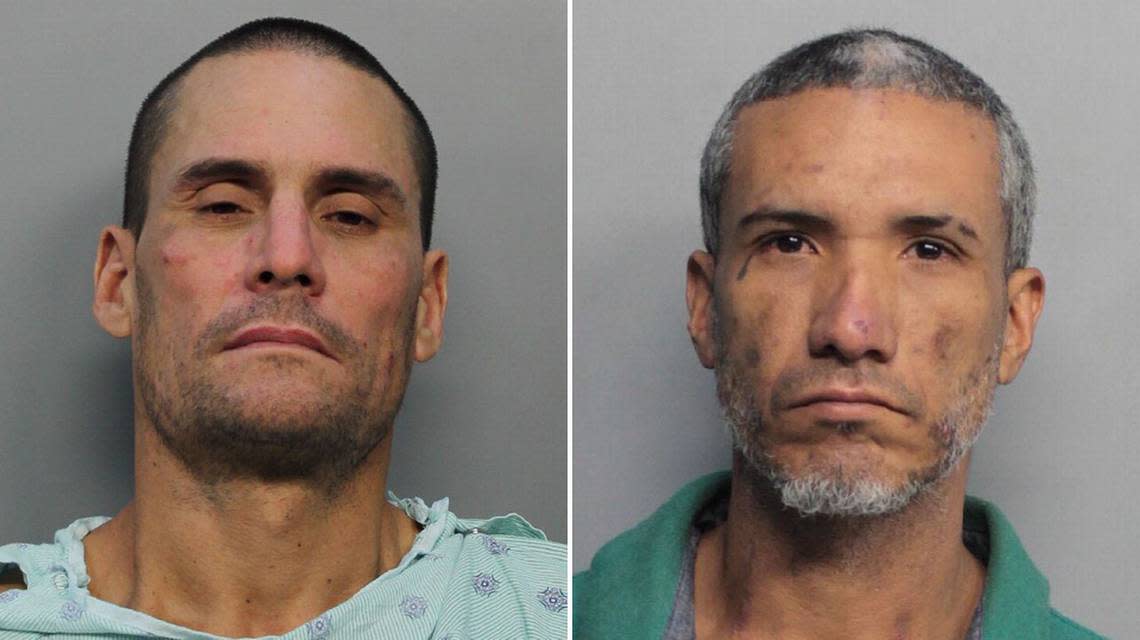Another inmate has died in Miami-Dade’s troubled jail system. He overdosed on fentanyl
A Miami-Dade jail inmate found unconscious in his cell last month died of a fentanyl overdose, the latest in a string of inmate deaths that have alarmed a federal court monitoring the troubled corrections system.
Rodney Latzzis was the 13th inmate to die this year in the custody of Miami-Dade Corrections, which has been under federal court supervision for nearly a decade because of concerns about inadequate medical care and shoddy conditions for the incarcerated.
The Miami-Dade Medical Examiner’s Office this week revealed he died of a fentanyl overdose, a death that yet again raises questions about the persistent problem of contraband drugs in the county’s three jails. He was found unresponsive Sept. 22 inside his single cell at a clinic inside the Pre-Trial Detention Center, the aging jail across from the criminal courthouse.
“If the department of corrections cannot protect an inmate from getting an overwhelming amount of fentanyl that results in death, then maybe more inmates should be getting lower bonds or GPS monitoring,” his defense attorney, Andrew Rier, said on Wednesday. “With the amount of deaths that have happened in the jails this year, there needs to be a serious re-evaluation of inmate safety.”
Miami-Dade police are now investigating how Latzzis got the drug. The corrections department said it is taking a series of steps to curb the introduction of drugs into the jails, including increased searches of the jails and scanning mail — which can sometimes be used to smuggle in narcotics — and printing out copies of letters to inmates.
In a statement released Wednesday, Miami-Dade corrections said it “is greatly saddened by this incident, and we extend our deepest condolences to the Latzzis family.”
“In addition to the law enforcement investigation, MDCR will conduct a full review of protocols, policies, and procedures that may have contributed to this tragic incident as we look at all possible strategies that can combat the movement of narcotics in our facilities,” the statement said.
This was the first inmate overdose death this year in county jails. Four others were suicides. One other was a homicide. The rest died of natural causes, according to corrections.
A persistent problem
Fentanyl and its synthetic variants — which can be up to 50 times more powerful than heroin — have wreaked havoc on communities across Florida in recent years. Jails and prisons haven’t escaped the crisis either.
Five years ago, two Miami-Dade jail inmates, Jesus Perdomo and Juan Salgado, collapsed and died inside the Miami-Dade Pre-Trial Detention Center, overdosing on fentanyl. Two other inmates were hospitalized but survived.

Two inmates, Nathaniel Vargas and Carlos Martinez, were later indicted for murder under a newly passed Florida law that made it easier for prosecutors to charge those who provide the drug with murder. Both men are still awaiting trial.
In response, the corrections department installed high-tech body scanners to check for inmates suspected of hiding contraband on their bodies. The scanners, by law, cannot be used on corrections officers. In 2018, a longtime Miami-Dade officer was arrested and later convicted of receiving illegal payments to bring in at least one phone and fast food into the Metro West Detention Center.
How Latzzis received his fentanyl remains under investigation. Twice earlier this year, a Miami-Dade judge signed orders recommending that Latzzis, who was in a wheelchair, be kept separated from other inmates over concerns he was being attacked by others. But by law, judges can’t order jails to house inmates in certain facilities or wings.
Latzzis, 34, was awaiting trial in a human-trafficking case. He’d been kept in general population at the Pre-Trial Detention Center, but was moved to the clinic after he fell ill.
The spate of deaths this year was the subject of scathing criticism by a federally appointed monitor who has been overseeing ongoing jail-reform efforts.
In 2011, the U.S. Department of Justice concluded a three-year investigation, saying the nation’s eighth-largest jail system engaged in a “pattern and practice of constitutional violation” of the rights of inmates housed in deplorable living conditions under abusive, inadequate or limited care. Two years later, the department was later placed under a federal “consent decree,” a plan imposed on the jail system to improve conditions.
But change had been frustratingly slow and inmates continue to die at a higher rate than at other large jail systems, Susan McCampbell, the monitor in DOJ’s civil-rights case against the county, wrote to a federal judge in August.
“The on-going harm to inmates is due to the County’s failure to competently act, after all these years. This is more than just a concern; it is alarming,” she wrote.
In recent months, Miami-Dade Mayor Daniella Levine Cava has several times shaken up the upper ranks of the department, which oversees over 4,000 inmates behind bars on any given day. Most recently, she appointed a retired Idaho sheriff, Gary Raney, to usher through reforms.
“We’re in reform mode,” Levine Cava told U.S. Judge Beth Bloom at a hearing on Oct. 12.
The most recent monitor’s report did not address contraband in the jails.
The department, in its statement, said “fentanyl is extremely difficult to detect, and as a result poses significant challenges for jail systems nationwide.”
In addition to scanning mail, the department said it is considering a version of the “Crime Stoppers” program, one that would allow staff and inmates to anonymously submit tips to curb contraband in the jails. “And we are working to implement additional positive programming including job training and other opportunities for inmates,” the statement said.
